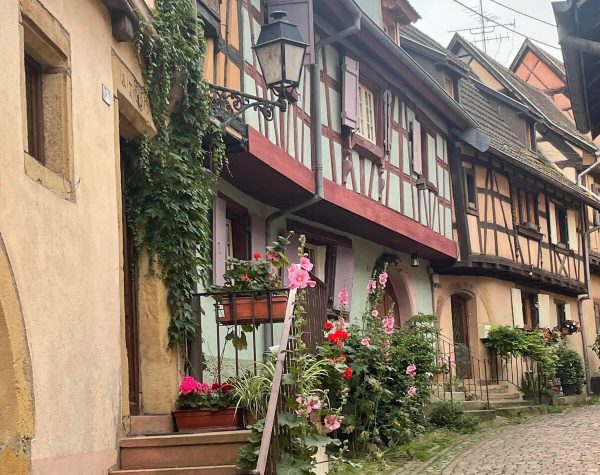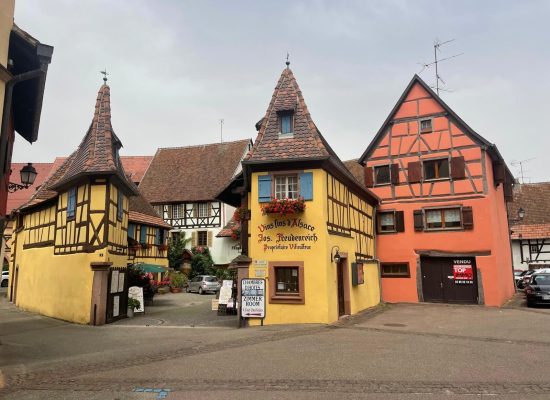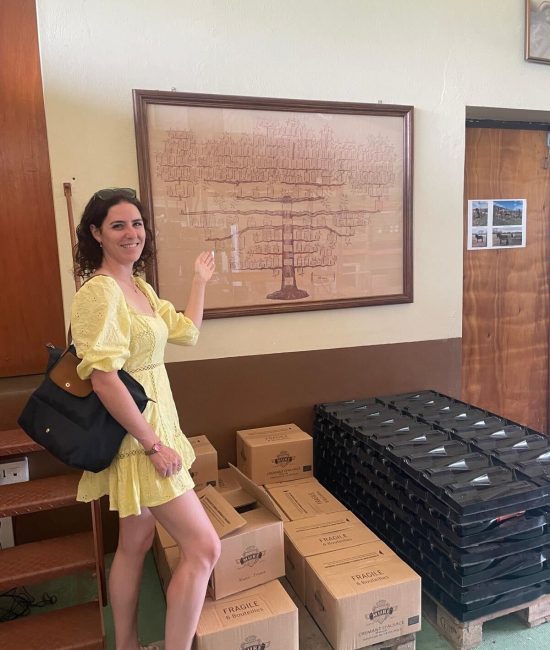Exploring Alsace - the Wine Haven of Eguisheim

Nestled in the northeastern corner of France, Alsace is a region renowned for its picturesque villages, half-timbered houses, and, most notably, its exceptional wines. Among these charming locales, Eguisheim stands out not only for its fairy-tale aesthetic but also for its vibrant wine culture. This small village, encircled by lush vineyards and steeped in history, is a paradise for wine enthusiasts. Let’s embark on a journey through Eguisheim, uncovering its wine-tasting treasures and the unique flavours that define this enchanting region.
Alsace is one of the most beloved wine regions in the world for wine lovers and novices alike. With a reputation for excellence not only in France but throughout the world, it should be on the bucket list of wines to try and a must-visit destination. Alsace is one of the driest wine regions in Europe. Sheltered by the Vosges Mountains, which shelters the vineyards from western winds, you create sunny summers and dry autumns. Due to this cool continental climate and dryness – organic and biodynamic growing practices are widespread in the region.
A Brief Introduction to Eguisheim and Alsace Wine Tasting
Eguisheim is often cited as one of the most beautiful villages in France, and for good reason. Located just a few kilometres southwest of Colmar, this village is the birthplace of Alsatian viticulture. Its concentric streets and quaint, flower-adorned houses create a captivating atmosphere that feels like stepping back in time. Beyond its aesthetic charm, Eguisheim boasts a rich winemaking heritage that dates back to the Roman era, making it a cornerstone of the Alsatian wine tradition.
The secret to Eguisheim’s exceptional wines lies in its unique terroir. The village is situated on a geological fault, which results in a diverse range of soil types, including limestone, marl, and sandstone. This diversity allows for the cultivation of a wide variety of grapevines, each thriving in its specific microclimate. The region’s cool climate, tempered by the Vosges Mountains, ensures that the grapes mature slowly, developing complex aromas and flavours—perfect for an authentic Alsace wine tasting experience.


The grape varieties of Alsace
Alsace is celebrated for its white wines, which account for over 90% of the region’s production. Eguisheim, with its favourable terroir, produces some of the finest examples of these varietals. Here are a few must-try wines when engaging in Alsace wine tasting:
Riesling: Often regarded as the king of Alsace wines, Riesling from Eguisheim is characterised by its elegance, minerality, and pronounced acidity. These wines are perfect for ageing, developing complex notes of petrol and honey over time.
Gewürztraminer: This aromatic wine is a sensory delight, bursting with flavours of lychee, rose petals, and exotic spices. Gewürztraminer from Eguisheim is known for its rich texture and slightly off-dry finish, making it an excellent companion for spicy dishes.
Pinot Gris: Known for its full-bodied richness and smoky undertones, Pinot Gris from this region offers flavours of ripe stone fruits and a hint of honey. It’s a versatile wine that pairs beautifully with a wide range of foods.
Muscat: Alsatian Muscat is dry, unlike its sweeter counterparts from other regions. It’s intensely aromatic, with floral and grape notes that make it a delightful aperitif.

Wine Tasting in Eguisheim: Where to Go
Exploring the wine culture of Eguisheim is best done through visits to its numerous wineries and tasting rooms. Many of these establishments are family-owned, offering a warm and personal touch to your Alsace wine tasting experience. Here are a few notable stops:
Domaine Gruss: Known for its dedication to traditional Alsatian winemaking, Domaine Gruss produces wines that beautifully express the local terroir. Their tasting room is a welcoming space where you can enjoy a range of their exquisite wines.
Muré: This historic estate has been crafting exceptional wines for over five centuries. The Muré family’s commitment to the land and terroir finds expression in their wines. Be aware this winery is about a 5-minute drive from Eguisheim – but worth the trip!
Wolfberger: One of the larger cooperatives in Alsace, Wolfberger offers a comprehensive tasting experience. Their extensive range includes not only traditional varietals but also sparkling Crémant d’Alsace, perfect for those who enjoy a bit of effervescence.
What to pair with Alsace wines for tasting
No Alsace wine tasting experience in Eguisheim would be complete without indulging in the local cuisine. Alsatian food is hearty and flavourful, designed to complement the region’s wines. Here are a few classic pairings:
Choucroute Garnie: This traditional dish of sauerkraut with sausages and meats pairs beautifully with a crisp, dry Riesling, whose acidity cuts through the richness of the dish.
Tarte Flambée: Also known as Flammekueche, this thin-crust pizza-like dish topped with onions, bacon, and crème fraîche is delightful with a glass of Pinot Blanc or Sylvaner.
Munster Cheese: This pungent local cheese finds a perfect partner in the aromatic Gewürztraminer, balancing its strong flavours with sweetness and spice.
FAQs
How much does Alsace wine tasting cost?
Alsace wine tasting does not need to be expensive – in fact, it is one of the cheaper wine regions in France to visit. Most wineries do not charge for tasting and visitors are welcome into the tasting room and can try most wines on offer. From there, especially in the smaller cities such as Eguisheim, you can expect to pay between €5 to €15 per bottle. This includes the Grand Cru wines too!
How to travel around for Alsace wine tasting?
Alsace is a very large region, so we recommend being based in the southern portion where the premium quality vineyards are and most of the best Grand Cru vineyards are situated. Base yourself in a local village with lots of tasting rooms to enjoy. There isn’t much public transport in the region so to visit the other wineries that are a bit more rural, you will need a car. Biking has become very popular in the area too and similar to the Loire, can be a nice way to travel between wineries.
